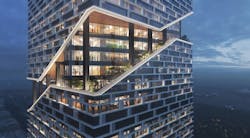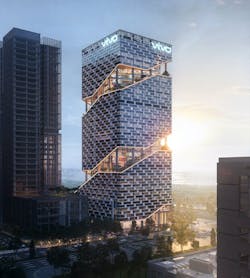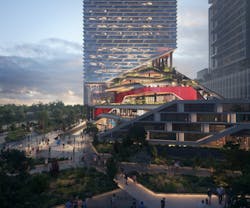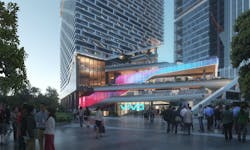New HQ for Chinese tech supplier will feature gardens on every floor
Construction began last month on the new corporate headquarters for vivo, a fast-growing China-based tech and smartphone provider. The building is scheduled to be substantially completed in the fall of 2025, when it will include as part of its amenities package indoor-outdoor gardens on every one of its levels.
The 32-story, 97,000-sm tower, which will soar 150 meters in the Bao’an district of Shenzhen, China, will feature gardens that ascend, in a spiral design, alongside a health- and wellness-focused work environment.
“We know that today’s workers thrive in ‘whole life’ environments that integrate nature, health and work. Our design is the physical embodiment of that ethos—fluid, sustainable, and center[ed] around the wellbeing of those who use the space,” says Robert Mankin, Partner in charge of workplace design at NBBJ, the design architect on this project.
GARDENS WILL EVOKE CHINA’S BIO-DIVERSITY
The building, scheduled for completion in 2025, will rise 150 meters.
Along with NBBJ, the Building Team includes Atkins (sustainability consultant), InHabit (façade consultant) BPI (lighting consultant), CADG (landscape), and WSP (vertical transportation). The local AE team is overseen by Tongji Architectural Design, whose scope includes construction drawings, as well as structural and MEP engineering.
The building’s green spaces move from a ground-level plaza with retail through the tower, where they transition to evoke the diverse biomes found in Southeast China, from coastal wetlands and lowland forests to subtropical and alpine forests.
Also see: A Poland firm takes vegetative façade to a new level
The building is designed to achieve WELL and LEED Gold certifications. To protect against rising flood waters due to climate change and typhoons, NBBJ has proposed sustainability features that include permeable surfaces and landscaping for drainage back into the ground.
Rainwater will be captured in underground tanks and reused.
WORKPLACE ZONES GET FULL EFFECT OF GARDENS
The gardens on the first four above-ground floors will be connected, and lead to a collection of gardens and terraces on the middle floors.
Since the outdoor gardens spiral up and change location on each level, “we developed a smart and systematic planning strategy to zone the workspaces so they get the most of the gardens,” explains Vivian Ngo, a Principal and one of NBBJ’s architects on this project, in written responses to BD+C’s questions.
So pantries will always be adjacent to the gardens as a starting point, with workspaces shifting around on each level. Ngo notes that, in a typical office plan, the core is usually the starting point.
To minimize columns, some of the outdoor garden spans are quite large, says Ngo. The structural engineering ensures that the garden zone has enough capacity for planting soil and enough clearance in the floor below without additional columns.
Furthermore, in typhoon-prone Shenzhen, the outdoor elements in these high-rise gardens, such as plant species and exterior doors, will need to withstand storms.
CLIENT LOOKS BEYOND CONSTRUCTION COST
A welcoming street-level plaza will include retail.
Ngo says that the design team considered whether to connect the gardens throughout the entire building, so that occupants could walk from level 5 (the first floor above parking) to level 32 uninterrupted. The team ultimately decided, for efficiency sake, to connect the first four floors with gardens on the same side, as one unit.
The building will coil upward to The Atrium—a collection of terraces and gardens at the building’s middle levels—before finishing at the penthouse area that offers event space, conference rooms, and a view of Qianhai Bay.
Ngo says that while the building was designed before the coronavirus was declared a pandemic last March, its connecting stairs “could help decrease elevator use when traveling short distances between levels.”
The area of covered outdoor space counts toward the building’s gross floor area, or GFA, according to local codes. That’s an added cost, explains Ngo, and somewhat contrary to traditional real estate development economics. “However, the client was very open-minded,” she says, in its support of the outdoor garden design and its promise of unique wellness and productivity benefits “to create value beyond what can be measured in dollars or yuans.”



